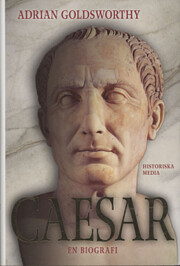

Click on a thumbnail to go to Google Books.
|
Loading... Caesar : en biografi (original 2006; edition 2009)by Adrian Keith Goldsworthy (Author), Charlotte Hjukström (Translator), Anette Rasmusson (Cover designer)
Work InformationCaesar : Life of a Colossus by Adrian Goldsworthy (2006)

Reading Glasses Podcast (345) No current Talk conversations about this book. Although we know that Julius Caesar's life came to an abrupt end, reading the long book emphasied how abrupt it was. Caesar had packed so much into his life, things appeared to have settled down, and then with what appears to be little preparation and thought, a group of senators selfishly put an end to that life. This episode fills just a few pages of this 500 page book. The rest is spent on his early life as he positions himself, quite cheekily, for promotion. A bulk of the book is spent on his time on Gaul, where some of the details of troop movements in battle do tend to be a bit tedious. However, a book that is worth reading. no reviews | add a review
Belongs to Publisher Series
Tracing the extraordinary trajectory of Caesar's life from birth through assassination, historian Goldsworthy covers not only Caesar's accomplishments as charismatic orator, conquering general, and powerful dictator, but also lesser-known chapters during which he was high priest of an exotic cult, captive of pirates, seducer not only of Cleopatra but also of the wives of his two main political rivals, and a rebel condemned by his own country. Goldsworthy realizes the full complexity of Caesar's character, places his subject firmly within the context of Roman society in the first century B.C., and shows why his political and military leadership continues to resonate some two thousand years later.--From publisher description. No library descriptions found. |
Current DiscussionsNonePopular covers
 Google Books — Loading... Google Books — Loading...GenresMelvil Decimal System (DDC)937.05092History & geography History of ancient world (to ca. 499) Italian Peninsula to 476 and adjacent territories to 476 Period of civil strife, 146-31 B.C. BiographyLC ClassificationRatingAverage: (4.25) (4.25)
Is this you?Become a LibraryThing Author. |
||||||||||||||||||||||||||||||||||||||||||||||||||||||||||||||||||||||||||||||||||||||||||||||||||||||||||||||||||||||||||||||||||||||||
Goldsworthy claims Caesar and his contemporaries were influenced by his sense of auctoritas - usually translated as “authority”, although with a more subtle meaning connected with honor and influence; you could have auctoritas without actually being in a position of legal or political authority (for example, Roman women could have auctoritas if they were in a position to influence political outcomes, even if they had no political authority themselves). Goldsworthy attributes Caesar’s crucial decision to “cross the Rubicon” with his army as due to fear (probably quite correct) that his auctoritas would be diminished if he didn’t. (I was surprised to note that despite the fact that “crossing the Rubicon” has become idiomatic for taking an irreversible step, nobody knows exactly where the Rubicon was; several small streams are candidates).
As with any good book, Caesar raises a lot of questions; one that intrigues me is that Goldsworthy makes it clear that success in the Roman political system required huge amounts of money. What for, exactly? It’s not as if it was spent on TV ads. Similarly, where did the money come from? Rome, after all, had no large corporations or even individuals who had become rich though trade or manufacturing. It seems like the only way to become wealthy was to be appointed governor of a province and then skim tax collections (this is what Caesar did; the conquest of Gaul allowed him to pay off all the creditors who had supported him thus far and have massive amounts left over for bribery and army recruitment). Goldsworthy gives some hints about Roman economics but a detailed account would require a whole other book; I’ll have to do some research.
There’s a lot more fascinating stuff than mention; this is a very worthwhile book and an easy read. A plate section shows people and sites; there are good maps of most of Caesar’s battles (at least as far as events can be reconstructed). Recommended. (